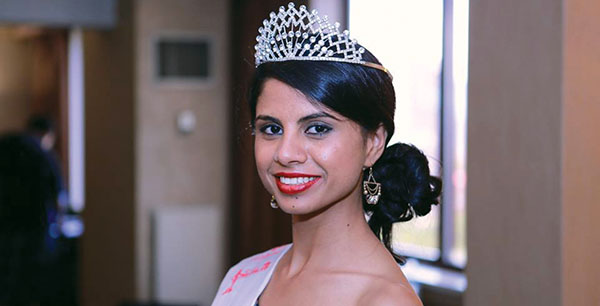My Voice: Stepping Out of My Comfort Zone and Into a Beauty Contest
It was the beginning of summer, and I was busy writing my second-year doctoral paper for the applied economics program at The Ohio State University. Procrastinating on Facebook, I came across the call for participants for the Miss Nepal US 2014 competition. The winning prize was $5,000 and a round trip ticket to Nepal—very attractive. My youngest sister wanted to go to medical school; this was a significant amount to put toward her education. I had always been active in sports and academics but had no knowledge of fashion and beauty. I was interested in the contest because participating would add to the diversity of my experiences, and I also might have the chance of breaking the South Asian stereotype of fair-skinned beauty queens. Most important, I thought, I could use the platform to connect my academic research world to non-academicians and spread the word on the importance of gender equality and economic development.
After filling out the application and participating in a Skype interview, I was chosen as one of the twenty finalists. With the help of family and friends I was able to raise the funds needed to participate, and soon I committed myself to giving the contest my full dedication.
No matter how good we are at our work, if we cannot sell it—and ourselves—we will find it very difficult to succeed.
Khushbu Mishra ’11
I needed to identify a talent first. So, I wrote a poem on domestic violence inspired by an incident with my neighbor, who was beaten to death by her husband in Nepal in 2011. For my cultural round, I reviewed recordings of previous contests and worked with my mother to put together the perfect lehenga—a traditional long, embroidered skirt. I was confident that I could handle the question-and-answer rounds, as I kept up to date with world news, including Nepali news. It was the catwalk part that I found most challenging. I practiced and learned to walk in two-and-a-half-inch heels only to realize, once I arrived in New York City for the contest, the other contestants were wearing shoes with five-inch heels.
During the training period I learned how to sit properly while trying not to feel as if my self-esteem were being questioned, and I helped other contestants feel more comfortable speaking publicly. We all practiced our skills together, and together our individual self-confidence grew.
Was it annoying to spend half an hour every day putting on makeup? Yes. But it was also satisfying to spend more time working out and living a healthy lifestyle. Did I feel uncomfortable conforming to the societal portrayal of women as objects of beauty? Yes. But it was also rewarding to hear the audience cheer when I talked against discrimination based on gender and skin color.
At the end of the contest I walked away with the title. Proud to have succeeded in achieving my goal and helping my sister add to her medical school fund, I immediately began planning my trip to Nepal, where I conducted a workshop on empowerment among rural women. In winning, I demonstrated my own thesis: in today’s world, no matter how good we are at our work, if we cannot sell it—and ourselves—we will find it very difficult to succeed.
To those who see beauty contests only in a negative light, I say we can put aside the criticism and work together to give voice to women and bring a positive change among us.
—By Khushbu Mishra ’11
This article appeared in the spring 2015 issue of the Alumnae Quarterly.
Have an opinion to share?
Pitch your topic to us at quarterly@mtholyoke.edu.
April 13, 2015








Leave a Reply